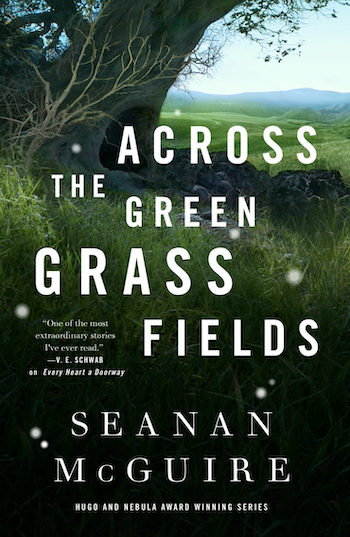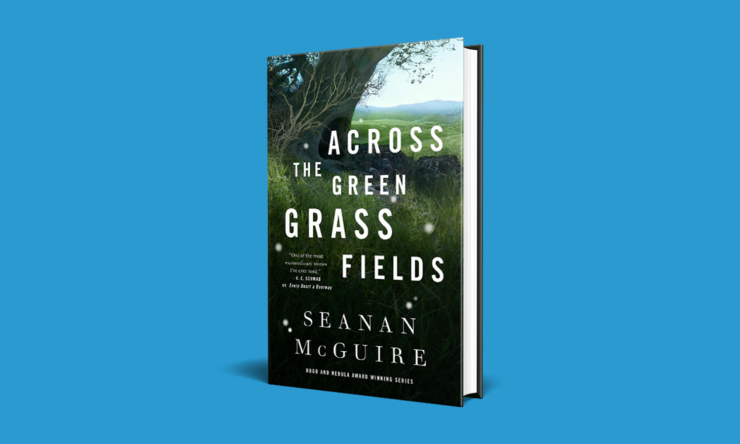Another year, another installment of Seanan McGuire’s brilliant Wayward Children series. Everything you love about the series is on full display in Across the Green Grass Fields, from children discovering new identities to inexplicable worlds full of strange creatures.
Each novella in Seanan McGuire’s Wayward Children series shares the same fundamental traits. A child whose identity marks them as different finds a world where their difference is what helps them survive. They aren’t othered but accepted. Their difference isn’t cured or ignored. The world accommodates itself to their needs and the child learns to live with their identity in a way that best works for them. Sometimes the parts of their identity that flourish in the portal world are ones that cause harm to others, such as Jill and the Moors, and sometimes life in their portal world becomes intolerable, such as with Kade and Prism, but these seem to be exceptions to the rule. The children don’t come out of the experience happier or better people, but complete and whole. That is, until they are returned to Earth and all its disappointments.
In the case of the sixth book in the series, Across the Green Grass Fields, we have Regan, a quiet, put upon little girl who loves horses. When she was younger, she made a choice that defined the course of her life. Mean girl Laurel forced Regan to choose between being her friend or being ostracized with their former bestie Heather, a girl who unintentionally committed a social infraction. Regan chose poorly by choosing Laurel, and the longer she lives with that choice the harder it is to extricate herself from it.
Buy the Book


Across the Green Grass Fields
Years later and Heather is still isolated and friendless and Laurel is still a petty tyrant. The other girls who form Laurel’s clique tolerate Regan because she was there first, but they don’t care about her. The only reason Laurel keeps Regan around is because Regan has learned to quash everything that goes against Laurel’s rules, particularly her rules about how to be a “proper” girl. When Regan learns she’s intersex, she tries to take her parents’ insistence that she is still the same girl she always was even if she’s a little different from her friends. But that means telling Laurel that her definition of “girl” is too narrow, an act that she immediately realizes was a mistake. Fleeing from Laurel’s abuse, Regan finds a door. “Be sure,” it says. She isn’t, but she enters anyway. That surety comes much, much later.
In the Hooflands amongst the matriarchal centaurs, Regan suddenly finds herself the arbiter of human femininity. Humans are rare in the Hooflands, so much so that the centaurs don’t have another one to compare her to. For all they know, she is a typical human girl child. And the thing is, she is. Being intersex matters, and that Regan identifies as a girl also matters. The centaurs accept her for who she is with no complaint or bigotry. No longer must Regan contort herself to fit someone else’s definitions or rules; in the Hooflands she determines what a girl should be like.
Across the Green Grass Fields is the pinnacle of Horse Girl literature, and I’m not being sarcastic (okay, maybe just a little sarcastic). The novella is packed to the brim with horses and equine-esque creatures. However, where most people use the term “Horse Girl” as a pejorative, McGuire reframes it as a positive. Is Regan “obsessed” with horses, or does she simply know a lot about them? Society—or, more accurately, the patriarchy—applies the “Horse Girl” label as something shameful, something that makes a girl weird and atypical of “normal” girls. It’s one more way she fails to live up to the arbitrary Western standards of what makes a “good” girl. Regan keeps her love of horses mostly hidden from Laurel to prevent her from deeming them unworthy and forcing her to give them up. Regan’s knowledge of horses, like everything else different about her, is a boon for the Hooflands even as it’s looked down on on Earth.
It’s also interesting to contrast Regan’s experiences with Kade’s. Both children had destinies to fulfill in their portal worlds, but where Kade was expelled for embracing his truth, Regan was celebrated by those she cared about. Sometimes the wrong child goes through the wrong door, and sometimes the child that crosses the threshold grows up to become a young adult who cannot stay. Kade’s world was built for a person he couldn’t be; Regan’s was built for becoming the person she wants to be.
Across the Green Grass Fields is even more of a standalone than In an Absent Dream. Regan is an entirely new character who spends time in an entirely new world. No one from the school makes an appearance in this book, and no knowledge of the series thus far is needed to understand this specific novella. Presumably she’ll eventually end up at Eleanor West’s School for Wayward Children and get folded into the series-spanning plot in the seventh book, but nothing is set in stone.
This novella is the lightest of the Wayward Children series in terms of action and plot. While McGuire doesn’t devote as much intensity to the plot, the messaging and subtext are thrumming with energy. Across the Green Grass Fields is an excellent book in an excellent series. Even if you’re like me and have little interest in horses, you’ll still enjoy following Regan on her quest to become the best version of herself.
Across the Green Grass Fields is available from Tordotcom Publishing.
Read an excerpt here.
Alex Brown is a librarian by day, local historian by night, author and writer by passion, and an ace/aro Black person all the time. Keep up with her on Twitter, Instagram, and her blog.










